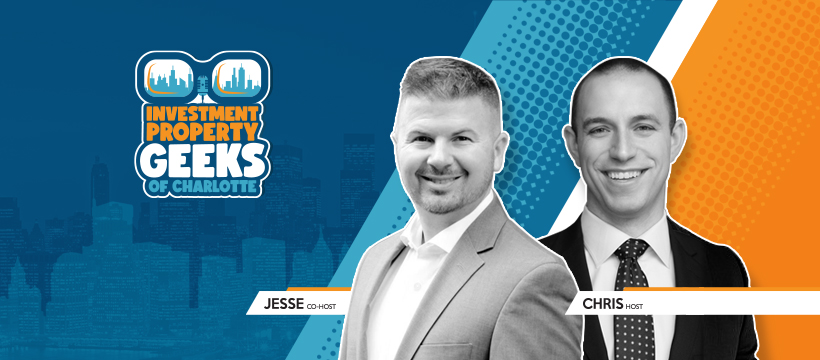No one ever wants to be forced to use their insurance. As real estate investors with multiple properties, we’ll all have to file claims at some point. There are several things you can do to minimize claims, such as:
Thorough background checks
Consistent property inspections
Preventative maintenance
Knowing your property
No matter how much you do to prevent them, insurance claims will happen. We want you to be prepared for them.
In this episode, Chris and Jessie invite Rob Squatriglia to share his knowledge on insurance. Rob Squatriglia is the co-owner of Summit Insurance Group and has been an insurance agent for over 30 years. Rob and his wife Lisa started Summit Insurance Group from scratch in 1995. While they started small, the Business Journal now rates Summit Insurance Group as one of the largest Property and Casualty Insurance agencies in the greater Charlotte market. And they show no signs of slowing down.
Rob’s business model primarily focuses on commercial insurance. He writes policies for general liability, business, automotive and workers’ compensation, to name a few. As an independent agency, Summit Insurance offers over 30 insurance carriers for Commercial and Personal lines insurances.
To add to his list of qualifications, Rob has been on the North Carolina’s Certified Insurance Counselor Advisory Board for the past 20 years. His agency is active with various charities and non-profits in the area.
If it’s time to update your commercial or personal lines insurance, request a quote today with Summit Insurance Group.
Insurance: Why You Need It and What to Look For
As a landlord, is your current home owner’s insurance policy valid after placing a tenant in the home?
The short answer is: no.
To cover your interest, you’ll need a landlord policy. Insurance companies assume that when someone rents a car, the renter is not going to treat the vehicle as well as their own. The same goes for your home and the tenant. It is a nuanced process, but a good insurance agent will help the landlord get the policy just right.
A landlord policy must include things such as:
Coverage for their interest
Liability for the tenant
Liability for the property
If applicable, coverage for the contents
Your landlord policy is the last line of defense keeping your interests safe. There is no room to cut corners when considering landlord policies.
Homeowner’s Policy v. Landlord Policy
Homeowners have different situations, occupationally and personally. Because of that, there is a wide variety within homeowners insurance. A landlord’s insurance is much stricter about what it covers, because there is increased risk. When selecting a landlord policy, you must:
Insure the property to value
Have adequate contents coverage
Establish ample liability limits
For a real-world example, imagine someone with a single-family home who is exploring what kind of liability to add to their policy. We recommend they:
Have at least a $300,000 limit for liability
Have a substantial umbrella policy on top of their standard insurance
When you have more liability, the insurance carriers will pay more attention. Most would avoid this due to cost, but it is not expensive to jump from $300,000 to $1 million in liability. The final price would only be about $25 more per year.
There are three additional values to look at when deciding coverage and liability:
Tax Value - what your home is worth
Market Value - what your home could sell for
Replacement Costs - what it would cost to build the house from the ground up
An insurance agent will walk the homeowner through a cost estimator and building value estimator to find the overall value of their home. It is imperative you insure the home at its current value, not its purchase value. Homes can appreciate substantially, and insuring at the purchase price guarantees lost money.
As with any insurance policy, it is vital to know exactly what is covered under homeowners’ and landlord’s insurance. There is an important distinction between “sudden and accidental” damage—which is covered—and “wear and tear,” which is not.
For example, a pipe breaking due to freezing temperatures would qualify as sudden and accidental. But if you have a shower leak that has been ignored for several years and it damages your flooring, it would fall under wear and tear. This is yet another reason why frequent property inspections and preventive maintenance are a must.
Other hazards that are not covered by homeowner’s or landlord policy include:
Earthquakes
Flooding
War
Tree roots
As devastating as any of those events would be, they don’t play a large role in most investors’ bottom lines. Realistically, you will make or lose your money through preventative maintenance. If you learn one lesson today, it should be: know your property. Regular visits and thorough inspections will pay you dividends.
What About a Vacant Home?
After a home has been vacant for 60 or more days, it automatically loses some coverage. In this case, it is important that the homeowner notify their insurance agent and ask how to proceed. Their suggestion may be displaying a vacancy permit on the property which reinstates coverage, or they may feel a different course is best to protect your investment. Requirements can vary drastically by state and county, so you must notify your insurance agent about long term vacancies as soon as possible.
Umbrella Policies
If you want to extend coverage beyond your standard home, vehicle and boat policies, an umbrella policy is the answer. Umbrella policies are a broad type of coverage that typically kicks in after you’ve exceeded your other coverages. For instance, if you are in a car accident that leaves you liable for one million dollars in damages but your car insurance only covers up to $300,000, then your umbrella policy would cover the rest.
Higher value umbrella policies come with better coverage. In most cases, the first one million dollars in liability will only cost around $175, decreasing in price as you increase the liability. Excess liability policies work similarly and are another way to extend your coverage past its original liability.
Comparing Price Between Homeowner and Landlord Policies
If you have questions about switching from a homeowners policy to a landlord policy—or vice-versa—speaking to an insurance agent is the best choice. There is an added risk with a tenant living in the home that will impact your coverage and cost. This is similar to how car insurance increases when you add a young driver first gets added.
Renter’s Insurance
When you’re renting out a home, you must inform the renter precisely what your insurance will cover. If you’ve followed our tips, your insurance will cover the property and your liability. The tenant will need to have contents and liability coverage. The two policies combined ensure that both parties are protected in the case of negligence.
The renter also needs to be sure the landlord is on their policy as a certificate holder or additional insured. If the renter is ever liable for more damages than their coverage, being an additional insured could prevent them from being taken to court or having their wages garnished.
It is standard for leases to require a renter’s policy and they are inexpensive for the coverage they provide. Most renter’s policies have coverage for the renter in the event the home is uninhabitable and can cover hotel or secondary rental costs. However, no matter how comprehensive a renter’s insurance is, the landlord and their policy are primarily responsible for the property.
Insurance and Contractors
As a final note, whenever you have work that needs completing on the property, pay close attention to your contractor’s insurance. Make sure they have a certificate of insurance that lists you as an additional insured. As an additional insured, you have access to one half of their coverage. And while you’re at it, verify their liability, workers’ compensation and auto coverage.
There is no doubt that insurance is a complicated subject. We’ve talked at length and only just scratched the surface. The best advice I can give to anyone is when in doubt, ask your insurance agent. Keep them involved in your property management, and don’t be afraid to ask them questions.
To get into contact with Rob Squatriglia to meet your insurance needs:
Call Summit Insurance Group at (704) 659-2141
Visit the Summit Insurance Group website at www.sumins.com







